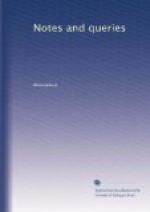Locke’s proposed Life of Lord Shaftesbury.—I perceive that the interesting volume of letters of Locke, Algernon Sidney, and Lord Shaftesbury, published some years ago, by Mr. Foster, is advertised in your columns by your own publisher; and I therefore inquire, with some hope of eliciting information, whether the papers in Mr. Foster’s possession, which he has abstained from publishing, contain any notices of the first Earl of Shaftesbury; and I am particularly anxious to know whether they contain any references to the Life of Lord Shaftesbury which Locke meditated, or throw any light upon the mode in which Locke would have become possessed of some suppressed passages of Edmund Ludlow’s memoirs.
C.
Theses.—Many German works introduced into Catalogues, are theses defended at the universities. The name of the President is generally first, and in larger letters than that of the propounder, who is usually the author. Hence, it often happens, that the Thesis is entered as a work written by the Praeses. But is not unfrequently happened, that this Praeses was really the author; and that, as an easy way of publishing his thought, he entrusted an essay to a candidate for a degree, to be defended by him. The seventh rule of the Museum Catalogue runs thus:—
“The respondent or defender
in a thesis to be considered its
author, except when it unequivocally
appears to be the work of
the Praeses.”
Now, I would ask, what are the usual signs of the authorship? Are there any catalogues of Theses? Any bibliographical works which contain hints for guidance in this matter? Any correspondents who can advise generally on the whole matter?
M.
Apocrypha.—What editions of the Bible containing the Apocrypha are now on sale at the ordinary way?
J.B.’s Treatise on Art and Nature.—By a scrap of a book, apparently of the sixteenth century, it seems to be a Treatise by J.B. upon Art and Nature: the first book is “of Water-workes.” What book is this?
M.
Nursery Games and Rhymes.—In the Letters and Memoir of Bishop Shirley, allusion is made (p. 415.) to a once popular game called “Thread the needle,” the first four lines of which are given. Can any of your readers supply the remainder, or refer me to any work where they may be found? I also should feel obliged by any information respecting the age and origin of the popular nursery song, beginning,—
“A frog he would a-wooing go,
Heigho, says Rowley.”
Perhaps some of your readers will state where the correct text may be met with.
B.G.J.




